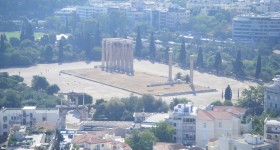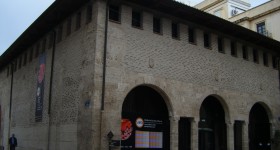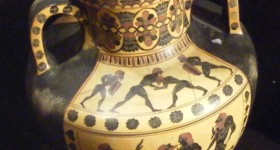Institute of Historical Research Postgraduate Courses
Each year the IHR, University of London runs a wide-ranging and extensive programme of training in skills for historical researchers from universities throughout the UK. Using a range of teaching approaches (workshops, seminars, lectures, hands-on practicals and visits), important and specialised skills are explained and explored by expert practitioners. Courses are short (from one day to one term), cover the whole range of necessary skills – from archival use and languages to databases and the internet – and are priced to be within the means of students. I have found these courses very useful when I was a PhD student and I am certain that if I lived in London I would have attended a couple of these, too.
“Archival Research Skills
Methods and Sources for Historical Research (22-26 November 2010/ 11 – 15 April 2011 / 4-8 July 2011)
This long-standing course is an introduction to finding and using primary sources for research in modern British, Irish and colonial history. The course will include visits to the British Library, the National Archives, the Wellcome Institute and the House of Lords Record Office, amongst others. Fee £200.
Visual Sources for Historians (Tuesdays, 8 February – 8 March 2011)
An introduction to the use of art, photography, film and other visual sources by historians (post-1500). Through lectures, discussion and visits the course will explore films, paintings, photographs, architecture and design as historical sources, as well as provide an introduction to particular items both in situ and held in archives and libraries. Fee £200
General Historical Skills
An Introduction to Oral History (Mondays, 17 January – 28 March 2011)
This course addresses theoretical and practical issues in oral history through workshop sessions and participants’ own interviewing work. It deals with the historiographical emergence and uses of oral history, with particular reference to the investigation of voices and stories not always accessible to other historical approaches. It will examine theoretical and methodological issues, for instance concerning memory, the interviewing relationship, ethics and the uses to which recordings may be put. And it will help students to develop practical skills in interviewing, recording, the preservation of cassettes and the organization and preservation of oral material. The course fee is £200.
Interviewing for Researchers (9 May 2011)
For those who wish to investigate the recent past, collecting the testimony of relevant individuals is a vital resource. This course offers practical information and training on how to interview and how to use interviews for the purposes of research. The course will examine: (1) how to interview public officials (politicians and civil servants), security and intelligence personnel, scientists and technicians, and medical professionals; (2) what are the best practices for recording, preserving and transcription of interviews; (3) how to ensure interviewing techniques are ethical; (4) copyright and data protection issues; (5) alternative techniques such as group interviewing; and (6) the advantages and limitations of interviews. The fee is £70.
Freedom of Information: a Practical Guide for Historians (18 April 2011)
A practical guide to using the Freedom of Information Act to find and obtain historical source material. The fee is £70.
Dealing With the Media (3 December 2010)
Historians are increasingly called upon by print and broadcast media for expert comment and opinion. This course throws open the enormous range of opportunities offered by the mass media’s interest in history and teaches the skills and techniques academics need to make the most of it. Offered in association with the History and Policy Unit, through whom all applications must be directed. Contact the IHR for details. Fee: £300
Explanatory Paradigms: An Introduction to Historical Theory (Thursdays, 28 April – 30 June 2011)
A critical introduction to current approaches to historical explanation, taught by Prof John Tosh, Dr John Seed and Prof Sally Alexander. The contrasting explanatory frameworks offered by Marxism, psychoanalysis, gender analysis and Paul Ricoeur’s work on narrative form the central discussion points of the course, equipping students to form their own judgements on the schools of thought most influential in the modern discipline. Fee £200.
Languages and Palaeography
An Introduction to Medieval and Renaissance Latin I (Tuesdays, 12 October – 7 December 2010)
This ten-week course will provide an introduction to Latin grammar and vocabulary, together with practical experience in translating typical post-classical Latin documents. It is intended for absolute beginners, or for those with a smattering of the language but who wish to acquire more confidence. Students will emerge at the end with not just a strong grounding in the mechanics of Latin, but also an understanding of the changes that it underwent, and the new ways in which it was used in medieval and early modern Europe. The course is open to all who are interested in using Latin for their research. The fee for the course is £185.
Further Medieval and Renaissance Latin (Tuesdays, 11 January 2011 – 8 March 2011)
This course builds upon the basis of Medieval and Renaissance Latin I, deepening and extending understanding of the language. By the end of the course, students should feel confident to tackle most basic Latin historical sources. Fee £185.
Palaeography and Diplomatic (Tuesdays, 5 October 2010 – 18 May 2011)
This course provides an introduction to the history of script from the Roman Empire to the Early Modern period together with practical instruction in reading manuscripts and understanding the context in which they were written. The course concentrates on Latin and English palaeography in the British Isles, but scripts of other national traditions may be included if there is demand. This course is run by QMUL and taught by Dr Jenny Stratford: please email at jenny.stratford@rhul.ac.uk for further information and to apply for a place.
Information Technology Courses
Databases for Historians (14-17 December 2010 & 14 – 17 June 2011)
This four-day course introduces the theory and practice of constructing and using databases. Through a mixture of lectures and practical, hands-on, sessions, students will be taught both how to use and adapt existing databases, and how to design and build their own. No previous specialist knowledge apart from an understanding of historical analysis is needed. The software used is MS Access, but the techniques demonstrated can easily be adapted to any package. This course is open to postgraduate students, lecturers and all who are interested in using databases in their historical research. The course fee is £185.
Databases for Historians II: Practical Database Tools (13-15 July 2011)
The aim of this course is to develop the practical skills necessary for constructing and fully exploiting a database for use in historical research. Assuming a basic understanding of the conceptual issues in digitally managing information from historical sources, the course aims to introduce the specific tools and techniques required for improving the utility of the database from the data entry stage, through to the generation and presentation of analysis. The course consists of ‘hands-on’ practical sessions in which students are provided with practical guidance on employing these techniques through the use of Microsoft Access. Familiarity with the basic concepts of database use is required: participants should be confident working with Microsoft Access, and should have some knowledge of working with data tables and simple queries. The course fee is £160.
Internet Sources for Historical Research (7 December 2010 / 7 March 2011 / 7 June 2011)
This course provides an intensive introduction to use of the internet as a tool for serious historical research. It includes sessions on academic mailing lists, usage of gateways, search engines and other finding aids, and on effective searching using Boolean operators and compound search terms, together with advice on winnowing the useful matter from the vast mass of unsorted data available, and on the proper caution to be applied in making use of online information. The fee for the course is £70.
Qualitative Data Analysis Workshop (24 January 2011)
Researchers in the social sciences and humanities are increasingly using computers to manage, organise and analyse non-numerical data from textual sources. This one-day workshop introduces historians to this rapidly growing field and will furnish participants with a good working grasp of the NVivo 8 software package and its uses for all historical research projects. Fee £120.
For further information and application forms see http://www.history.ac.uk/research-training or contact Dr Simon Trafford at Institute of Historical Research, University of London, Senate House, Malet Street, London, WC1E 7HU or by email at ihr.training@sas.ac.uk”
Classics list





